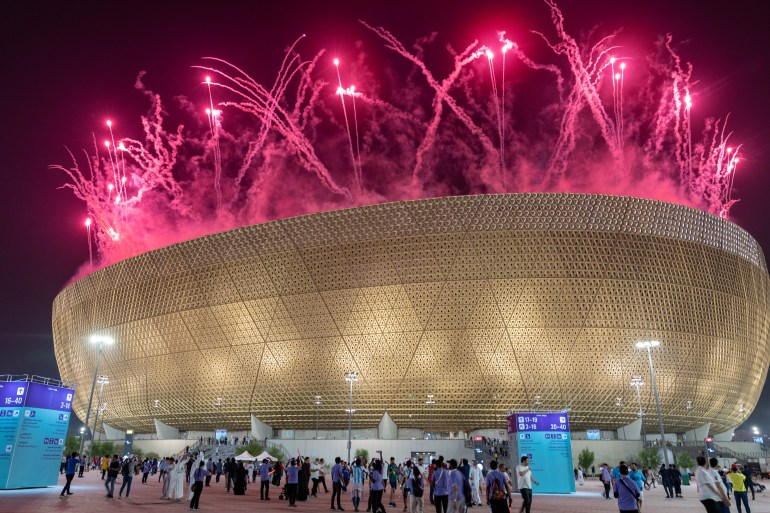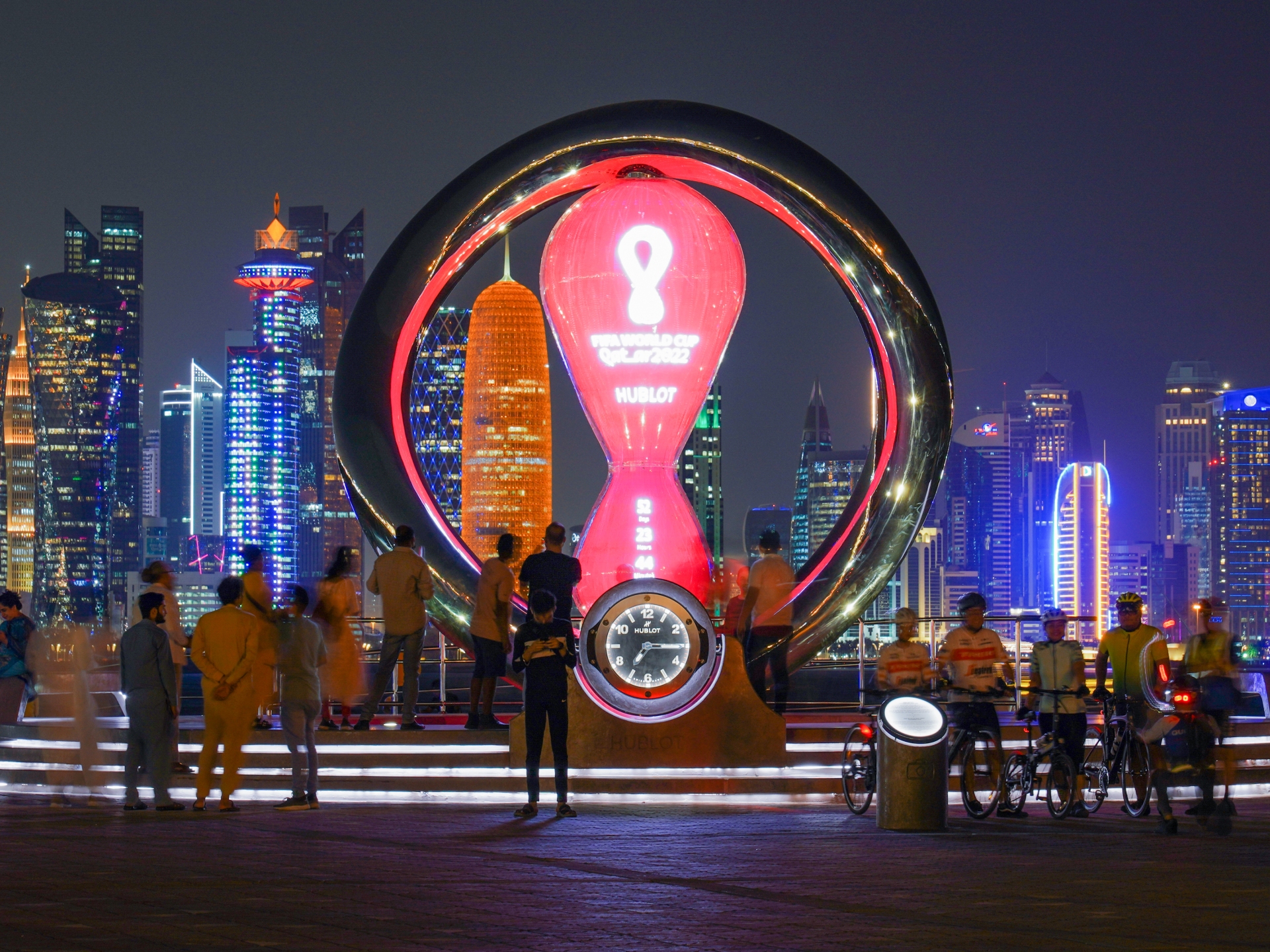In 2010, Qatar was awarded the right to host the 2022 FIFA World Cup.
The country would become the first in the Middle East to host the world’s biggest sporting event, beating stiff competition from the United States and Australia.
Since then, a flurry of corruption allegations and claims of Qatar “buying the World Cup” have surfaced while the country’s treatment of migrant workers has also been in the spotlight.
Here is a timeline of events and landmarks since Qatar won the World Cup bid:
December 2, 2010
Qatar is awarded the rights to host the 2022 FIFA World Cup, becoming the first country in the Middle East to host the world’s biggest sporting event.
May 5, 2011
Then FIFA vice-president Jack Warner, suspended over a corruption investigation, leaks an email from FIFA’s general-secretary claiming Qatar “bought” the rights to host the World Cup.
May 10, 2011
A British parliamentary inquiry into why England failed to secure the 2018 World Cup was told by MP Damian Collins there was evidence from the Sunday Times newspaper that Issa Hayatou of Cameroon and Jacques Anouma of the Ivory Coast were paid by Qatar.
May 2011
Whistleblower Phaedra al-Majid, who was part of Qatari World Cup’s bid, claims Qatar paid $1.5m to African Football Confederation president Hayatou, Anouma and Nigeria’s suspended Amos Adamu. All three denied the allegations.
Al-Majid later said that she had fabricated her claims. In November 2014, she stated that she was coerced into withdrawing her allegations over security concerns and lack of legal representation.
July 17, 2012
FIFA President Sepp Blatter announced that former US attorney Michael Garcia and German judge Hans-Joachim Eckert had joined the organisation to investigate allegations of wrongdoing.
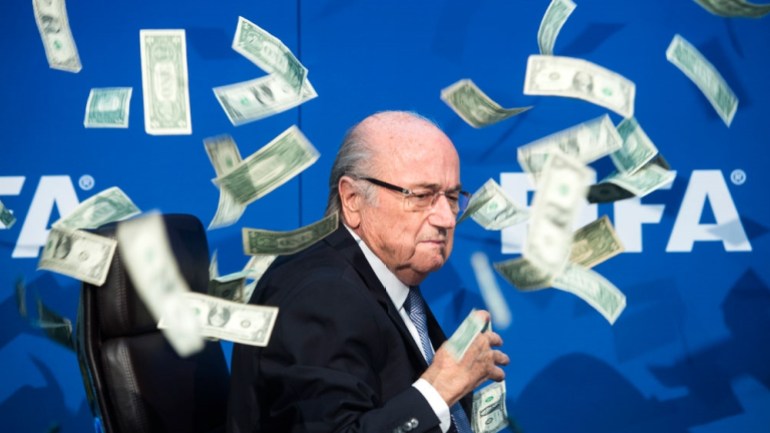
September 25, 2013
British newspaper The Guardian publishes an investigation finding that thousands of Nepalese workers in Qatar face exploitation and abuses that amount “to modern-day slavery”.
November 18, 2013
A report by Amnesty International finds Qatar’s construction sector rife with abuse, with workers employed on multimillion-dollar projects suffering serious exploitation.
March 17, 2014
British newspaper The Telegraph publishes an investigation revealing former FIFA executive Warner and his family were paid nearly $2m from a firm linked to Qatar’s campaign to obtain rights to host the World Cup.
September 5, 2014
FIFA receives three reports from ethics investigator Garcia and his team after their year-long probe. Eckert refused to publish that report.
September 24, 2014
Garcia calls on FIFA to make his report public.
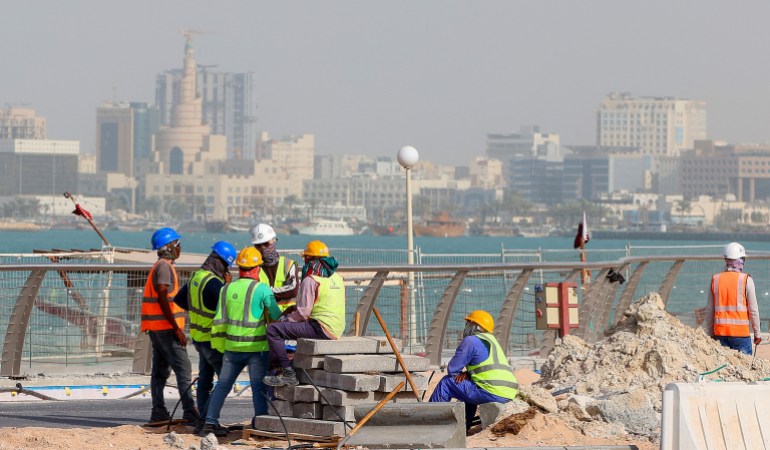
November 13, 2014
Eckert releases a 42-page summary, clearing Russia and Qatar of any wrongdoing and allowing both countries to stage the tournaments. Garcia declared the report “materially incomplete and erroneous”.
November 20, 2014
FIFA says it will further review the awarding of hosting rights for the 2018 and 2022 World Cups by studying a US prosecutor’s 430-page report into allegations of widespread corruption.
February 24, 2015
The 2022 World Cup moved to Qatar’s winter season due to concerns over extreme temperatures in the country during the summer.
May 27, 2015
The Office of the Attorney General of Switzerland opens criminal proceedings against persons unknown on suspicion of criminal mismanagement and money laundering in connection with the allocation of the 2018 and 2022 World Cups.
Swiss authorities also arrest seven leading FIFA officials in Zurich on racketeering and bribery charges brought by the US.
September 25, 2015
FIFA announces the 2022 World Cup will start on November 21.

September 29, 2015
FIFA bans Warner for life from football activities after he was found guilty of violating the organisation’s code of ethics several times.
April 1, 2016
Workers in Qatar renovating a stadium for the 2022 World Cup suffered rights abuses two years after the tournament’s organisers drafted worker welfare standards, Amnesty International reported.
April 22, 2016
FIFA’s new president Gianni Infantino announces plans to set up an independent committee to monitor conditions for labourers working at Qatar’s World Cup 2022 stadiums.
May 19, 2017
Khalifa International Stadium becomes the first tournament-ready venue for Qatar 2022.
![A general view of the Khalifa International Stadium [Supreme Committee for Delivery & Legacy]](https://www.aljazeera.com/wp-content/uploads/2019/09/33d984832b954fc59b8ae8780b5a50ee_7.jpeg?w=770&resize=770%2C514)
June 5, 2017
Saudi Arabia, UAE, Egypt and Bahrain cut off diplomatic ties with Qatar and impose a land, sea and air blockade after accusing it of supporting terrorism. Qatar strongly denies the allegations.
June 27, 2017
FIFA releases the full report on an investigation it conducted into allegations of corruption over the awarding of the 2018 and 2022 World Cups. The dossier provided a picture of a flawless voting process and no hard evidence that the committees used bribes to secure the rights.
October 26, 2017
Qatar’s government approves a draft bill to support a fund for its two-million-strong foreign workforce.
October 2017
Qatar enters into an agreement with the International Labour Organization (ILO), aimed at extensively reforming migrant workers’ conditions, including by reforming the kafala (sponsorship) system.
February 10, 2019
The Guardian reveals that Sir Lynton Crosby, a UK-based Australian political strategist, was offered to work on a campaign to get the 2022 World Cup awarded to another country in return for $6.4m.
March 15, 2019
FIFA’s council approved working with hosts Qatar to explore expanding the 2022 World Cup to 48 teams by adding at least one more country in the Gulf to host the tournament.
May 8, 2019
The first metro service opens to the public in Qatar’s capital, Doha.
![Doha Metro [Showkat Shafi/Al Jazeera]](https://www.aljazeera.com/wp-content/uploads/2019/05/03f2018117ec49bcadcd4e6ae26995ac_8.jpeg?w=770&resize=770%2C513)
May 16, 2019
Al Janoub Stadium is inaugurated. It is the first Qatar 2022 tournament venue to be built from scratch.
May 23, 2019
FIFA abandons plans to expand the 2022 Qatar World Cup to 48 teams.
June 18, 2019
French police detain for questioning former UEFA chief Michel Platini in relation to the awarding of the 2022 World Cup. He was released a day later.
September 4, 2019
Qatar reveals the official emblem of the tournament in synchronised display in Doha and 24 other major cities across the world.
![World Cup Logo projected on Doha Tower [Sorin Furcoi/Al Jazeera]](https://www.aljazeera.com/wp-content/uploads/2019/09/399818e0bd2b4cf3b74ec53642393092_8.jpeg?w=770&resize=770%2C513)
September 19, 2019
A new Amnesty International report revealed that “hundreds of migrant workers” have been forced to give up on “justice” and return home “penniless” since March 2018.
October 2019
Qatar moves to announce the abolishment of the kafala system, enabling workers to change employers.
October 11, 2019
A UN study praises measures taken by the tournament organising committee but it also stressed that improved safeguards and working hours are needed.
January 16, 2020
Qatar announces that most migrant workers previously prevented from leaving the country without their employer’s permission will no longer need an exit permit.
April 6, 2020
The US Department of Justice says that representatives working for Russia and Qatar had bribed FIFA officials to secure the hosting rights for the global football tournament.
June 15, 2020
Education City Stadium is inaugurated and it will host matches up to and including the quarter-final stage during Qatar 2022.
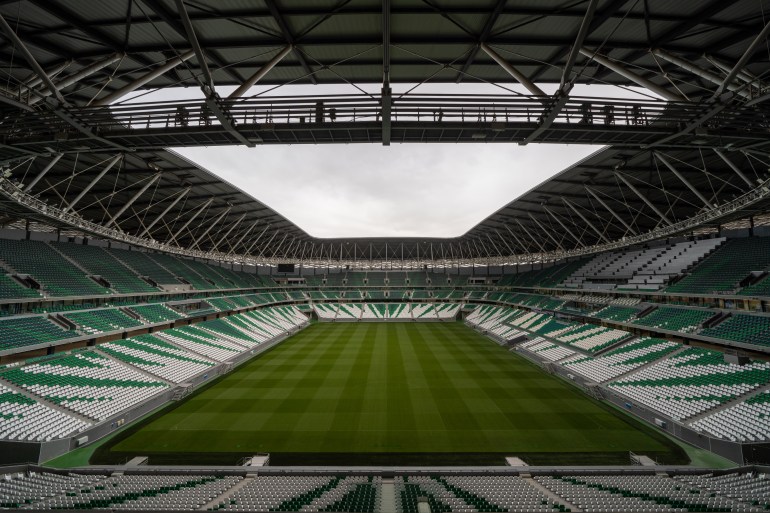
August 24, 2020
A Human Rights Watch report finds that employers across Qatar frequently violated workers’ right to wages and that efforts to improve the work environment have largely failed.
Migrant workers tell Al Jazeera they are struggling to survive due to salary delays, non-payment of dues and NOC (no-objection certificate) restrictions.
August 30, 2020
Qatar abolishes its controversial kafala system, allowing migrant workers to freely switch employers. The country also announced it will introduce a monthly minimum wage for all workers of 1,000 riyals ($275).
December 8, 2020
Qatar announces that it would comply with FIFA rules of promoting tolerance and rainbow flags will be allowed in stadiums at the 2022 World Cup.
December 18, 2020
Al Rayyan Stadium, the fourth Qatar 2022 World Cup venue is inaugurated.
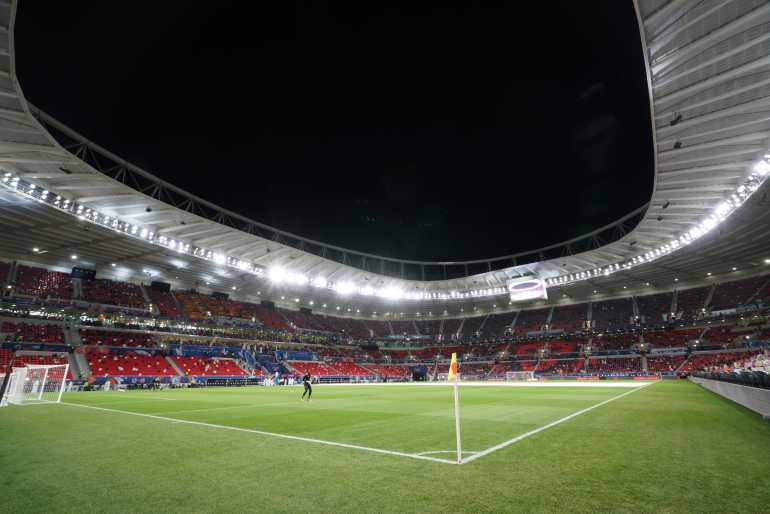
March 2021
An Al Jazeera investigation reveals while a number of workers were successful in switching jobs after Qatar abolished the kafala system, the majority of those interviewed experienced delays in the process as well as threats, harassment and exploitation by their sponsors, with some of the workers ending up in prison and eventually deported.
June 2021
A Kenyan national, arrested in Qatar in May and charged with “spreading disinformation”, was released but charges against him were not dropped.
Malcolm Bidali was “formally charged with offences related to payments received by a foreign agent for the creation and distribution of disinformation within the State of Qatar”.
October 22, 2021
Qatar inaugurates the fifth tournament stadium, the Al Thumama Stadium.
November 16, 2021
A 48-page report by Amnesty, Reality Check 2021, said that practices such as withholding salaries and charging workers to change jobs were still rife, despite labour reforms.
November 30, 2021
Ras Abu Aboud Stadium, also known as Stadium 974, is unveiled.
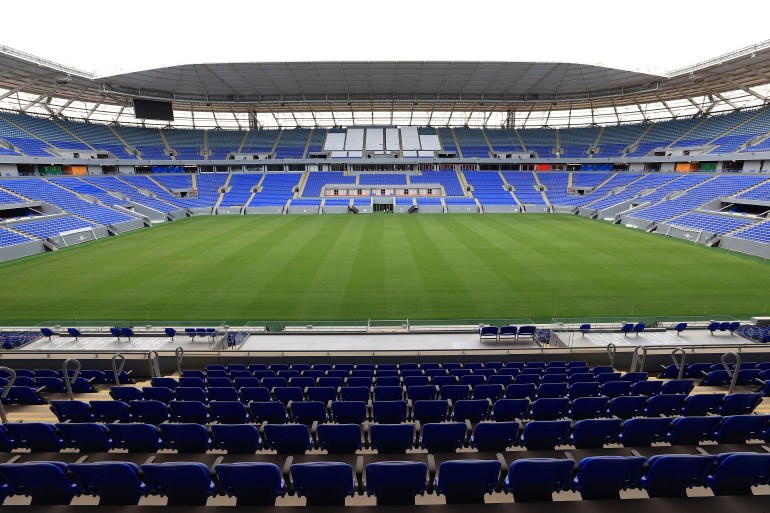
December 16, 2021
The court of appeal in Qatar upholds a guilty verdict handed out to a former 2022 FIFA World Cup official for bribery and misuse of funds but reduced his prison sentence from five years to three years.
Abdullah Ibhais, a former media manager at the Supreme Committee was arrested in 2019 and sentenced to five years in April 2021.
January 19, 2022
Tickets for the Qatar 2022 World Cup go on sale with prices for residents wanting to attend the games starting at 40 riyals ($11), the cheapest for locals since the 1986 World Cup in Mexico.
Meanwhile, Turkey announces it will send 3,250 security officers to Qatar for the World Cup and Ankara has also trained Qatari security personnel ahead of the competition.
April 1, 2022
The draw for the Qatar 2022 World Cup is held in the capital, Doha.
May 17, 2022
Human Rights Watch and Amnesty International, along with eight other human rights organizations, sent a letter to Infantino calling for FIFA and Qatar to compensate families of workers who died in the build-up to the World Cup.
June 8, 2022
Former FIFA president Blatter and former UEFA chief Platini are both cleared of corruption charges by a Swiss court.
August 11, 2022
FIFA announces the World Cup to start a day earlier than scheduled. The opening game, between Qatar and Ecuador, will take place on November 20.
